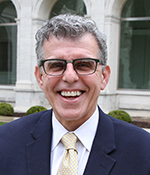February 2017

David Gozal, MD, MBA
For many of us a new year brings new goals and resolutions, whether professional or personal. This year, we should challenge ourselves to think more broadly and imagine what we can accomplish when directing our collective efforts to the public health front.
The ATS has a long history of advocating for the best interests of our members, their patients, and the general public. These efforts have been guided by the Society’s core missions since 1905, and our commitment to such worthy goals is steadfast:
- To improve lung health worldwide and
- To advance research, clinical care, and public health
Our focus does not change.
Yet what we do hope will change—and I hope you will consider—is the opportunity to become more engaged and increasingly involved in advocacy.
Harmful air contributes to a barrage of respiratory diseases. Exposure occurs at multiple levels, from inside the home, to family and community surroundings, as well as a result of the conditions of one’s country. Particularly in low-income areas, lung health is challenged by indoor air pollution, by limited access to education and health care, by less than ideal outdoor air conditions, by sub-optimal medical research funding, and by the ever changing economic pressures and globalization. Most of these factors are clearly beyond our control as individuals; they are systemic. And yet, some are clearly within our power to change.
Tobacco smoke, for instance, one of our greatest global health challenges, is preventable; yet how much of the issue reflects personal choice? In the European Union, health costs associated with tobacco use are a growing part of the EU’s GDP. In China, tobacco consumption is higher today than it was two generations ago, around the time the U.S. Surgeon General first issued an historical alert on the adverse health effects of tobacco smoking. Larger profit oriented systems and their marketing campaigns such as those of the tobacco industry are at play, and these formidable challenges are what our patients are really up against.
But we can work together to change this a prioriunavoidable reality, and other similar realities.
While our efforts on a global scale are primarily through the Forum of International Respiratory Societies, our national efforts are concentrated on Capitol Hill, in Washington. Over the years we have built a reputation for scientific objectivity and strong ties within key federal agencies, like the NIH and EPA. Decision makers at government institutions are keen to hear from constituents and experts with real-world perspectives. In 2016 we held briefings, met and testified with lawmakers, and helped uphold several of our profession’s public health priorities, including affordable health care, research funding, tobacco control, and clean air. We did not sit idle; we challenged the status quo and brought to the fore the best and most reliable scientific evidence in our quest to protect the public.
As leaders in the fields of pulmonary, critical care, and sleep medicine, your participation is indispensable to the ongoing debates involving our public health system. Wherever lung health is at stake, conversations must not take place without us. Our voices—your voices—are greatly needed. No matter where you base your practice, whether at a prestigious medical university or a humble mobile clinic, may you have the courage and resolve to make your voice be heard. This year, your voice is needed more than ever…
Visit the advocacy section of our website to learn more about FIRS, or how you can get involved in current government relations.

